Items
topic_interest is exactly
Education
-
2020-03
Old dog/new tricks! a new way to teach.....
I finally became a video star.....that was never my intention when I started teaching fifty years ago! I am an adjunct art professor. When lockdown came and I couldn't teach in person, I had to find a new way to teach my class.....Zoom felt too complicated to me so I communicated with my students via email and videos that my husband and I made in the basement! A 15 minute video took over 3 hours or more between the filming and the editing! In addition, I really had to work hard to find the best way to communicate-the most effective way to present the lesson, as no questions could be asked as I presented the material. It really got me to think and be very clear about the subject and the best way to teach it. Once in front of the camera, I made believe I was talking to my class and just ran with it! I felt comfortable once I started. It was funny though, as we had to carefully think about camera angles and outfits that worked well as I moved! After all, this was permanently on tape...And, I had to be brave! My Brooklyn/StatenIsland accent was forever heard, as well as facial features, expressions and body parts that have always plagued me be forever seen! Overall, though, a great experience!!!! Who would have thought that such an awful, disturbing period could bring about new, positive experiences! Ah, but that is life after all, isn't it? -
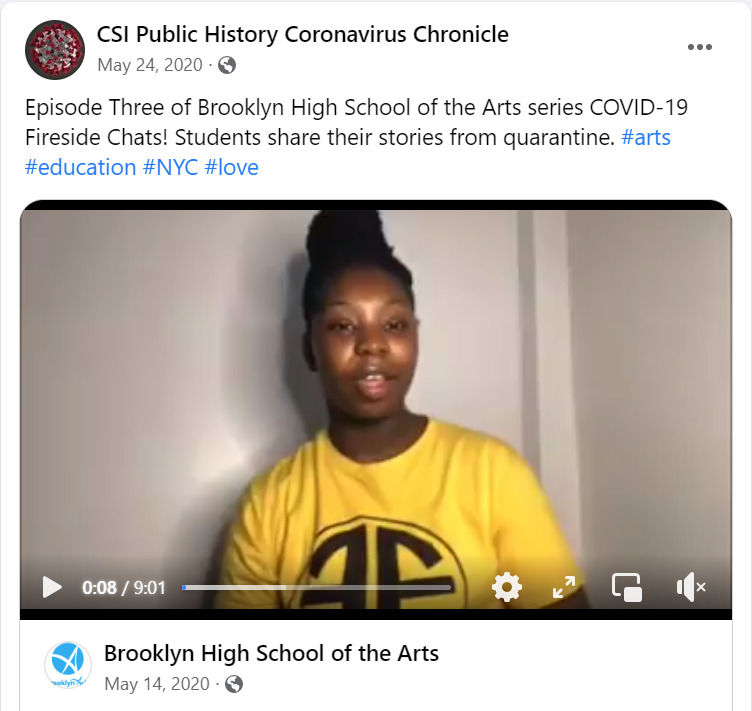 2020-05-24
2020-05-24Fireside Chat Episode 3
Episode Three of Brooklyn High School of the Arts series COVID-19 Fireside Chats! Students share their stories from quarantine. -
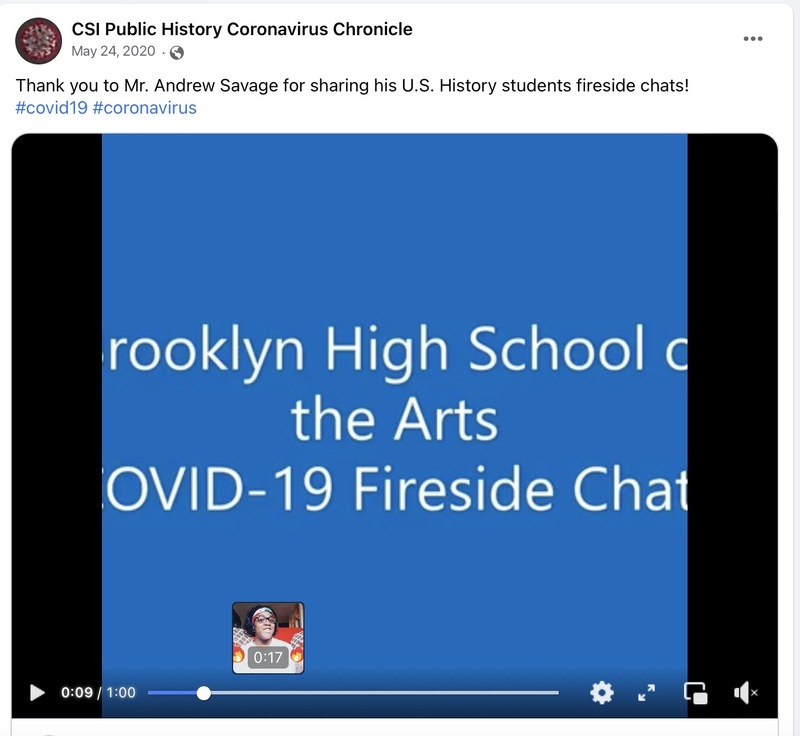 2020-05-12
2020-05-12The Fireside Video Chat
Brooklyn high School of the Arts: "Our students are the best storytellers! Tune in this week to see "COVID-19 Fireside Chats". Stories from quarantine from Mr. Savage's US History class! Tonight, First Period! See the full video in the link below. You won't regret it!" -
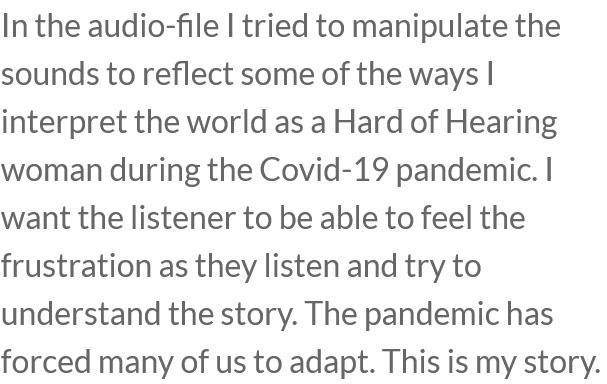 0022-08-18
0022-08-18Hearing Aids
In the audio-file I tried to manipulate the sounds to reflect some of the ways I interpret the world as a Hard of Hearing woman during the Covid-19 pandemic. I want the listener to be able to feel the frustration as they listen and try to understand the story. The pandemic has forced many of us to adapt. This is my story. -
 2021-03-20
2021-03-20Debating Through the Pandemic
I've been doing Model United Nations since my freshman year. Although it is a club infamous for the insanely intense students it produces, it's also known for its beyond fun 4-day conferences with food, a delegate dance (like a Homecoming), and chaotic debate sessions. However, COVID changed all of that for me, when all MUN conferences started going virtual, including our school's own conference. We started making speeches on Zoom and raising our virtual hands to get called on. We used Breakout Rooms to talk with other delegates and sat at our desks through four long strenuous days of debating. This story represents the dozens of other school clubs and sports teams that were thrown off guard in trying to alter their events to fit these new guidelines of the pandemic. But, to echo a larger sentiment, it represents how kids and their interests were able to adapt. Students still had safe spaces to pursue their interests, even if it was over Zoom. During this time, communities banded together and in some cases, even expanded, allowing classes of COVID-impacted kids to continue building their passions. In my case, I actually learned to love MUN for what it is, rather than be distracted by its bells and whistles. So, while the pandemic brought along its own challenges, it fostered adaptation at its finest, and relationships centered on keeping a sense of normalcy alive, even with something as small as a school club. -
 2022-02-01
2022-02-01More than Half of Teachers Looking to Quit Due to COVID
According to a poll given by the National Education Association, 55% of teachers who participated feel burned out enough from COVID-19 to quit. Some of the reasons that COVID-19 has caused additional stress for teachers is due to student behavior, additional responsibilities, and longer hours. -
 2022
2022Teacher Burnout is Real
826 National is a non-profit organization focused on helping students with their writing skills. In this post, they highlight statistics related to teacher burnout and stress during the second year of the pandemic. One of the most alarming statistics is that 90% of teachers that participated say that teacher burnout is a serious issue. The pandemic has exacerbated the stress put on educators and they have received little support in return. -
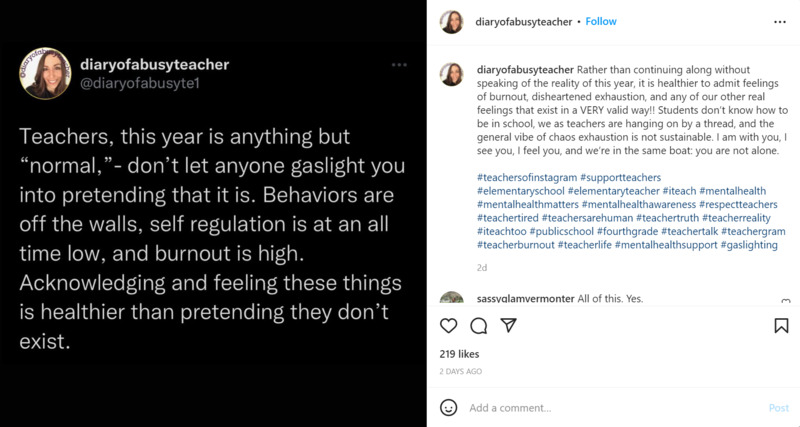 2022
2022Not a Normal Year for Teachers
This post shows an example of teachers supporting each other through the end of the 2022 school year. In many different places, people are acting as if life is "normal" again. Schools are not requiring masks or sanitation procedures, school is in session like normal, in-person assemblies, activities, and sports are occurring. However, teachers can definitely tell that everything is not normal, and our job continues to be increasingly more difficult. -
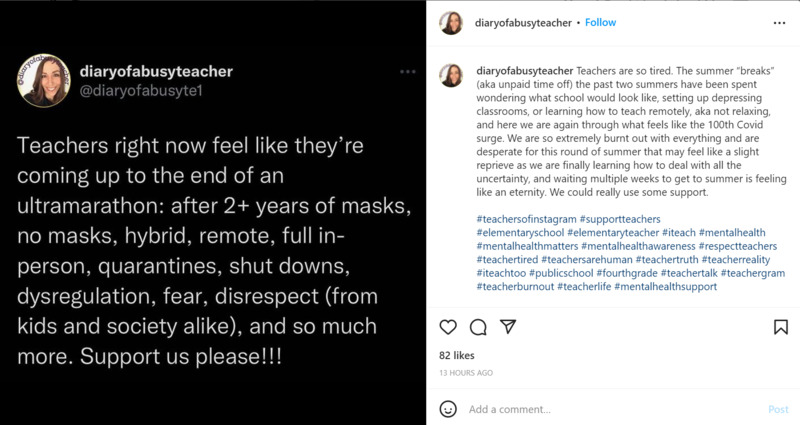 2022
2022Teachers are Tired
Now that we are ending the 2022 school year, many people have "returned to normal". Most students no longer wear masks in schools. However, we are still working through the pandemic. Teachers are still at risk for contracting COVID and are navigating the severe behavioral problems of students. With summer approaching, everyone is looking forward to a break from an extremely stressful year. -
 2022-01-10
2022-01-10Criticizing Teachers
Even before the pandemic, many teachers have felt that they are underappreciated. During the pandemic, the number of responsibilities on teachers increased. They have been forced to teach during a health crisis, putting themselves at risk. When teachers are sick, the remaining teachers are forced to pick up the work without any empathy if they are not able to fulfill all obligations. The expectations have increased as teachers are also battling increasing behavior issues. -
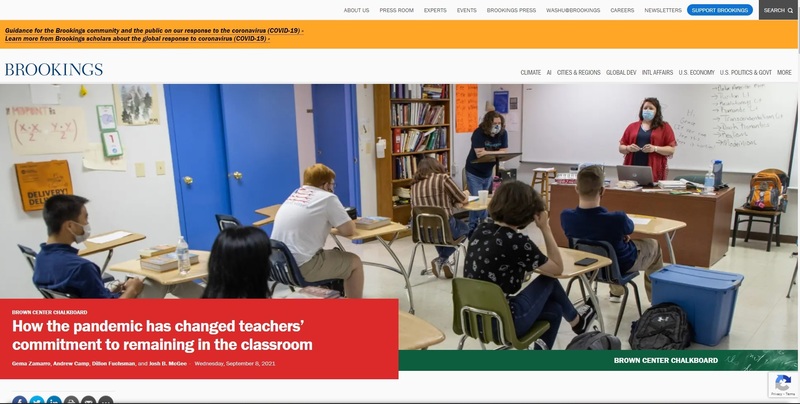 2021-09-08
2021-09-08How the Pandemic Has Changed Teachers' Commitment to Staying in the Classroom
According to the article, there was a 16% national turnover rate for teachers before the pandemic. A survey given in January 2021 shows that almost 25% of teachers stated that they wanted to leave teaching. Pre-pandemic surveys and surveys given during the pandemic also show that less teachers believe that they will stay in education until retirement. The pandemic has required that teachers maintain the same responsibilities, while also piling on constant communication with parents (even without a response), social-emotional lessons, plans for asynchronous and synchronous learning, teaching students virtually and in-person at the same time, keeping up with changing health and safety regulations, and having to deal with increasing behavior issues. -
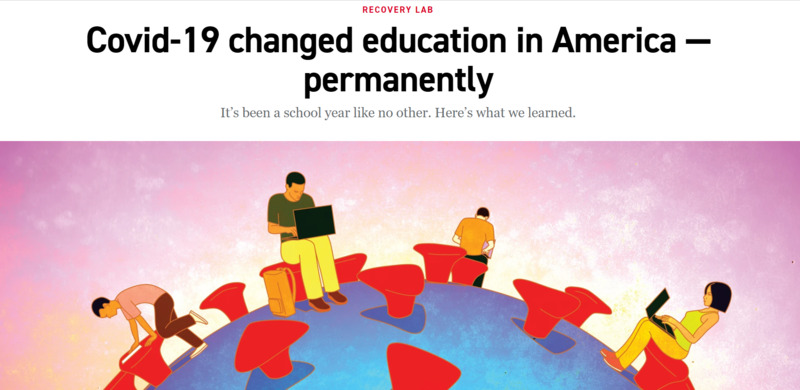 2021-04-15
2021-04-15COVID-19 Changed Education in America
The pandemic has completely changed education. Students' views and attitudes towards school has changed, as well as been impacted by trauma and lack of normal school routine. School districts and teachers have been scrambling to accommodate to the new change while also trying to maintain a feeling of being "normal" during a pandemic. -
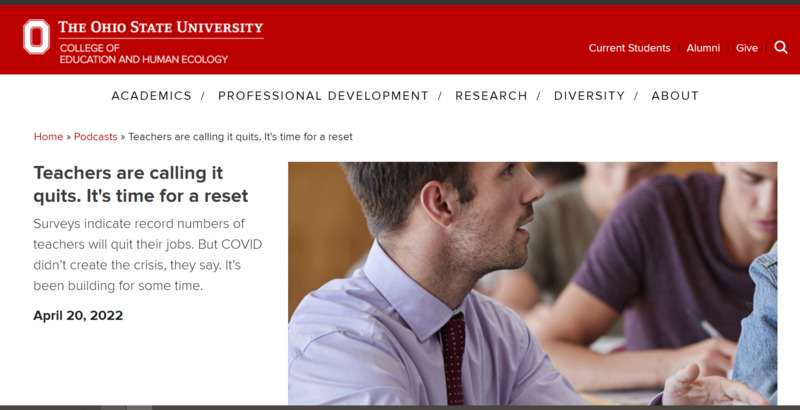 2022-04-22
2022-04-22Teachers Are Calling It Quits
Before the pandemic, teachers already experienced a job where they are overworked, often underpaid, and underappreciated. This article details rising frustrations by teachers during the pandemic and the subsequent leaving of many people from education. -
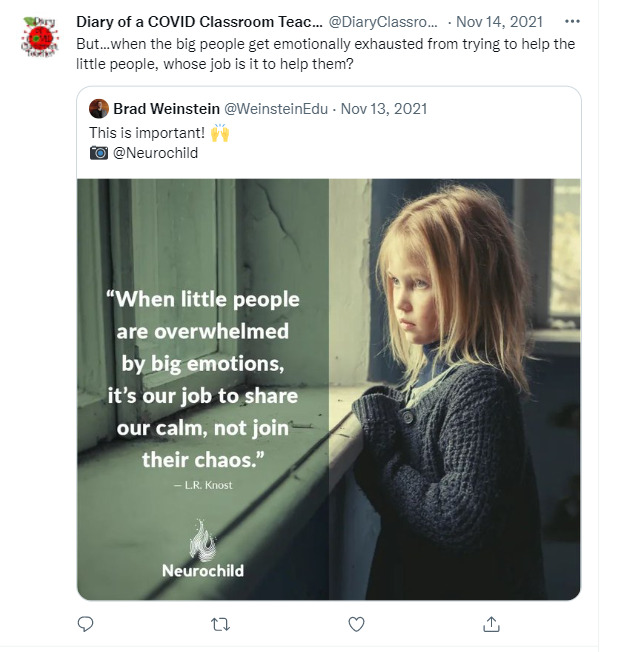 2021-11-14
2021-11-14Emotionally Exhausted Teacher
This item is a screenshot from a Twitter account known as the Diary of a COVID Classroom Teacher. This account's response to a picture about children with big emotions shows the frustrations that many teachers are facing during the pandemic. Many students have struggled due to the lack of routine and disruptions in their lives caused by COVID-19. Throughout the nations, behavior issues are being seen. Teachers are struggling more than ever while they try to help these students who are acting out while also staying on top of their other responsibilities. -
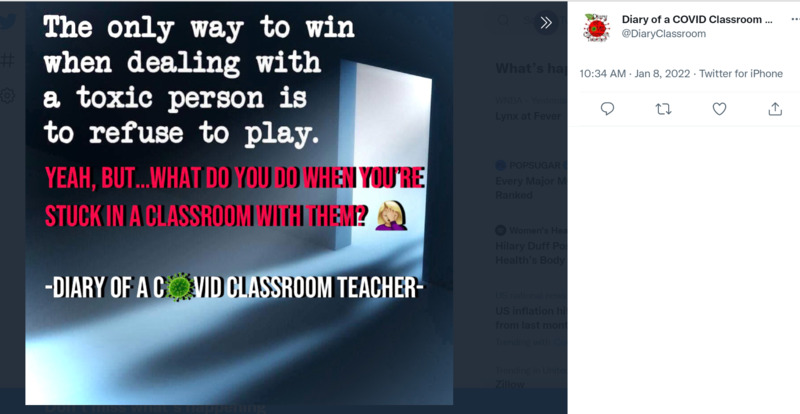 2022-01-08
2022-01-08Frustrations of a Teacher
The item is a screenshot from a Twitter post of someone known as "Diary of a COVID Classroom Teacher". For their post, they had edited a motivational photo to question how to handle a toxic person if they are in your classroom. This post expresses frustrations that are shared by many teachers during the pandemic. With many schools being entirely in-person for the first time in two years, teachers are experiencing a huge amount of behavior issues, most likely caused by lack of routine and social/emotional growth during this time. -
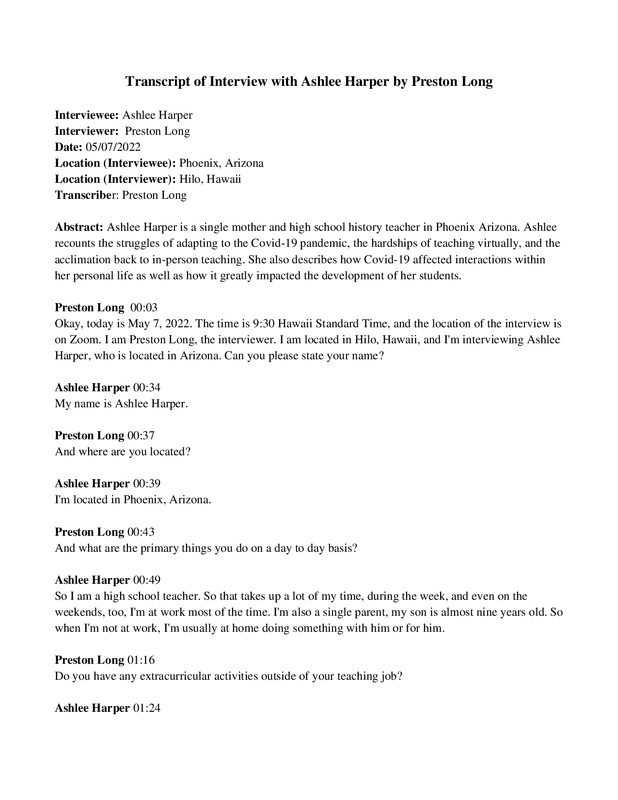 2022-05-07
2022-05-07Ashlee Harper Oral History, 2022/05/07
Ashlee Harper is a single mother and high school history teacher in Phoenix Arizona. Ashlee recounts the struggles of adapting to the Covid-19 pandemic, the hardships of teaching virtually, and the acclimation back to in-person teaching. She also describes how Covid-19 affected interactions within her personal life as well as how it greatly impacted the development of her students. -
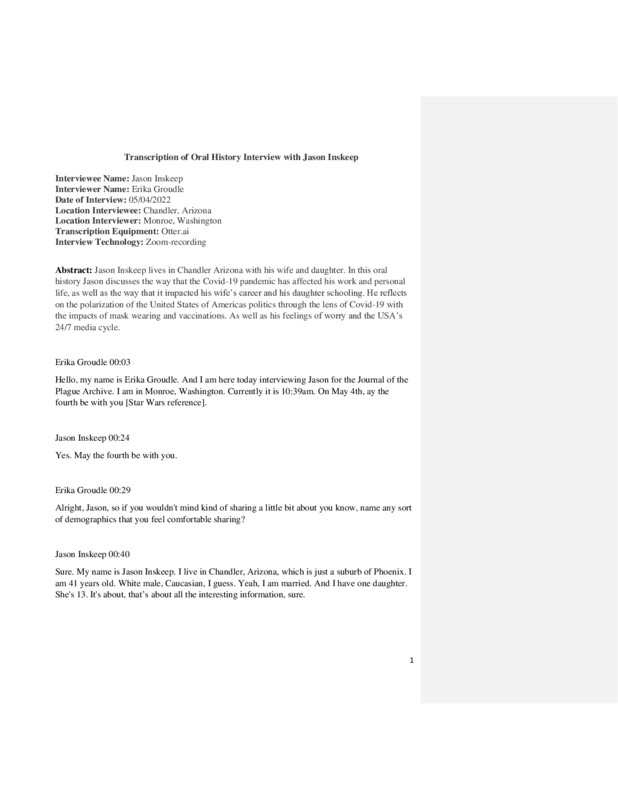 2022-05-04
2022-05-04Jason Inskeep Oral History, 2022/05/04
Jason Inskeep lives in Chandler, Arizona with his wife and daughter. In this oral history Jason discusses the way that the Covid-19 pandemic has affected his work and personal life, as well as the way that it impacted his wife’s career and his daughter schooling. He reflects on the polarization of the United States of Americas politics through the lens of Covid-19 with the impacts of mask wearing and vaccinations. As well as his feelings of worry and the USA’s 24/7 media cycle. -
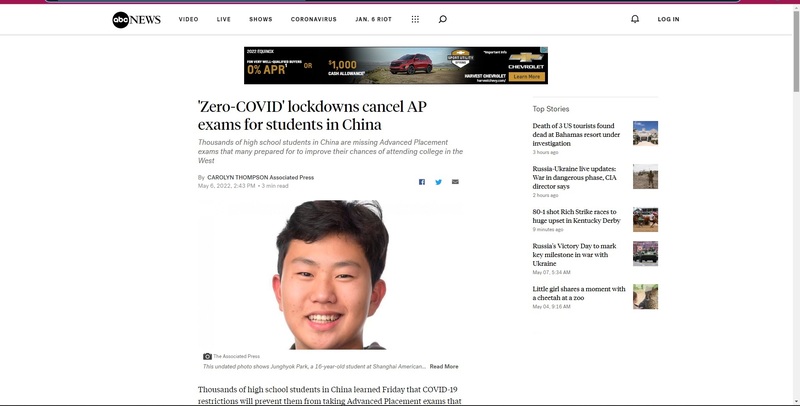 2022-05-06
2022-05-06'Zero-COVID' lockdowns cancel AP exams for students in China
This is a news story from ABC News by Carolyn Thompson. Due to China's COVID policy, the Advanced Placement (AP) tests have been canceled due to restrictions. Students are unable to visit for in-person tests that are used for AP tests. The College Board offered an online version of these tests, but that was only intended to be temporary. Some tests are being offered digitally, such as the ACT. The SAT remains impacted due to restrictions. Parents have accused The College Board of being indifferent to affected students that need these tests. -
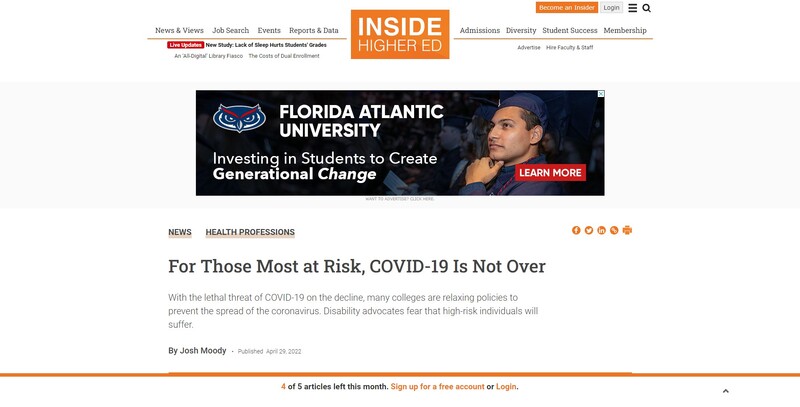 2022-04-29
2022-04-29For Those Most at Risk, COVID-19 Is Not Over
This is a news story from Inside Higher ED by Josh Moody. As schools begin to resume to pre-COVID standards, not all are happy with this change. Those with disabilities worry about the loosening guidelines and how it would affect their health. COVID rates vary across the country, but many colleges are starting to drop protocols. Some disability advocates claim that this is a wrong decision from the colleges doing this, as it is putting people at high risk in more danger. COVID Safe Campus, a group of high-risk academics and activists with disabilities, recently launched a report card grading college coronavirus policies. The effort, they say, grew out of concerns that high-risk individuals are being left behind as colleges return to pre-pandemic normalcy. Colleges are graded on masking, COVID-19 testing and vaccination policies, and access to remote learning. Of the 90 institutions graded from this organization, majority have received a D or an F, and none earned an A. -
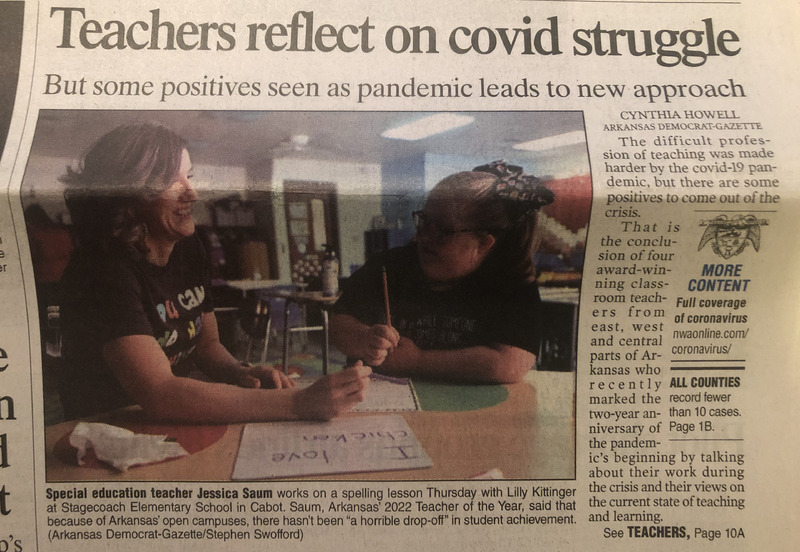 2022-04-03
2022-04-03Teachers reflect on covid struggle
This article details the reflection of a few Arkansas teachers as we reach two years since the beginning of the pandemic. The teachers highlight the drastic changes not only in safety precautions, but also the adjustments in order to provide meaningful learning in an entirely new landscape. Many of the teachers reported excitement at the prospect of a return to normalcy, however they desire some aspects of the pandemic adjustments to remain in place. Flexible learning, new and creative ideas of conveying topics, and more individualized learning methods have seen an increase in retention of material, which is fundamentally what education is all about. The teachers would also like an end to the stigma surrounding the covid learning adjustments, primarily the notion that education is now "entirely computer based". This notion is quite the contrary, according to educators, rather the new methods not only encourage flexibility and invite individualized learning but also promotes computer skills which will be vital for adulthood. I think this article is interesting because it highlights the fundamental change covid has made and continues to make on society. In order to promote public health and safety, teachers were forced to adjust and were forced to rework how they educated. This compelling of behavior has rendered some positivity. I think it is critical that children are able to have the safest and most effective education, and while covid seems terribly negative, there is a small glimmer of improvement from the pre-pandemic world. This article was published in the Northwest Arkansas Democrat Gazette. -
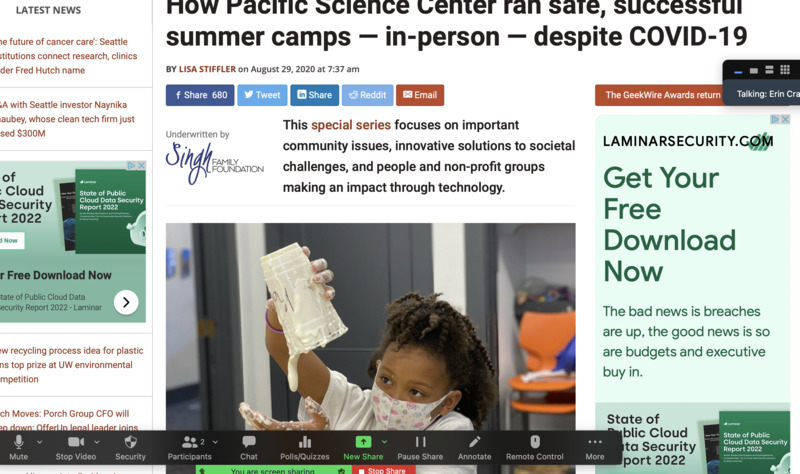 2020-08-29
2020-08-29Socially distanced and socially safe summer camp
The attached article is something that is probably not well known. In Seattle, Washington there is the Pacific Science Museum, a fun educational museum for all ages, but focused on kids. Every summer they run educational camps for K-8 graders. It was unclear if after months of distance learning (early pandemic, 2020) students would be physically or emotionally ready to do a group activity in person. PacSci’s camps were able to run while students were socially distanced and masked. This matters because there has been a lot of rhetoric about kids not being able to wear masks for a variety of reasons, but this article proves that kids were able to understand social distancing and mask-wearing so they could have a safe and fun thing to do. With these practices in place, combined with low group sizes, and the use of a lot of outdoor time, they didn’t have any transmission cases for the whole summer. Not included in the article but they had the same success the next summer, 2021, and are on track to continue again the summer of 2022. The significance is not just to a collection focused on children, but also to the service industry since this is a less formal education setting that leans more toward front-facing customer service. -
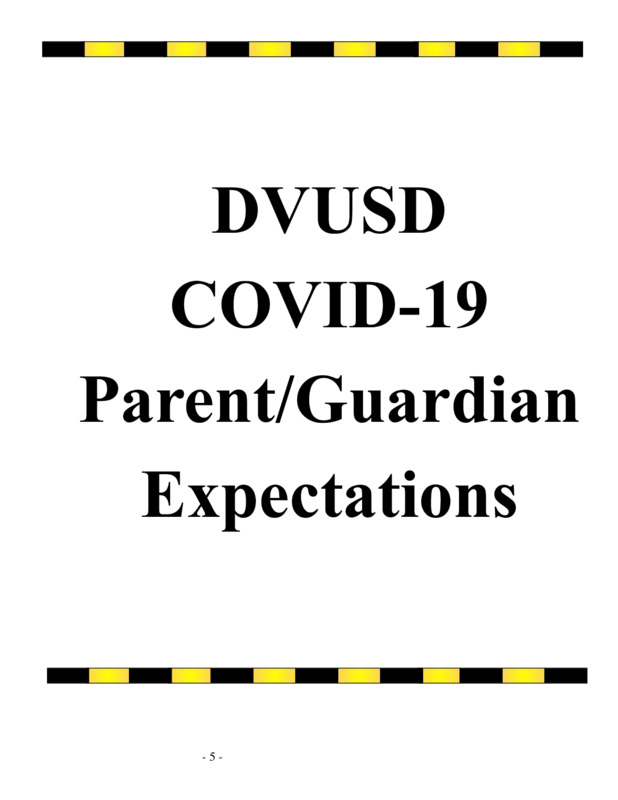 2021-07-15
2021-07-15High School COVID-19 Expectations and Procedures
The document is the "COVID-19 Parent/Guardian Expectations" section of a school handbook for the 2021-2022 school year. For this school district, the 2021-2022 school year is the first year since the pandemic started that would be entirely in-person. Due to this, school staff, parent/guardians, and students were expected to comply with essential health and safety standards. The handbook covers when students should be kept home from school, how to report symptoms of COVID-19 or a positive test, bus protocols, sanitation policies followed by teachers and school staff, mask expectations, cafeteria and food procedures, accommodations for social distancing, requirements of school volunteers, and athletics. This document shows how schools worked to create policies and procedures in order to keep students in school in-person. These procedures were created in anticipation of the first school year that would be completely in-person, since the 2019-2020 and 2020-2021 school years were partially online. -
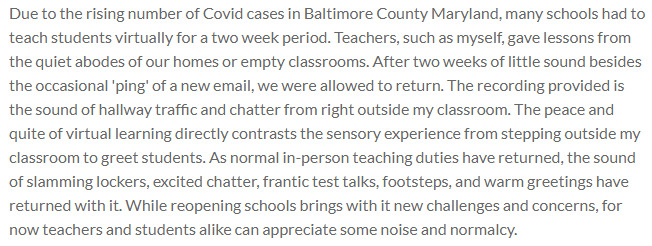 2022-02-03
2022-02-03A Return to Noisy Normalcy
Due to the rising number of Covid cases in Baltimore County Maryland, many schools had to teach students virtually for a two week period. Teachers, such as myself, gave lessons from the quiet abodes of our homes or empty classrooms. After two weeks of little sound besides the occasional 'ping' of a new email, we were allowed to return. The recording provided is the sound of hallway traffic and chatter from right outside my classroom. The peace and quite of virtual learning directly contrasts the sensory experience from stepping outside my classroom to greet students. As normal in-person teaching duties have returned, the sound of slamming lockers, excited chatter, frantic test talks, footsteps, and warm greetings have returned with it. While reopening schools brings with it new challenges and concerns, for now teachers and students alike can appreciate some noise and normalcy. -
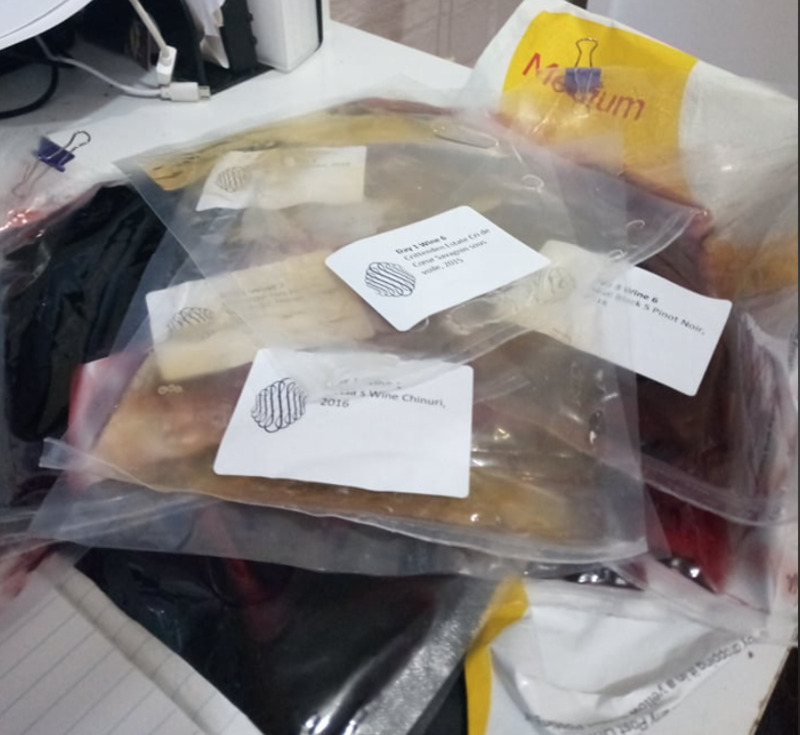 2021-09-07
2021-09-07Rolling with the pandemic
This year, I completed an intensive subject called Wines of the World at university. It was postponed many times due to restrictions, and the subject coordinators eventually decided that they would have to host the course entirely online. A key component of the subject was wine tasting, and this photo shows how this was made possible at home. Wine tastings in sous vide bags were posted to each student's house, a quite exciting and novel experience. This photo thus reflects how educators have had to be flexible around restrictions, and come up with new ways to facilitate learning. -
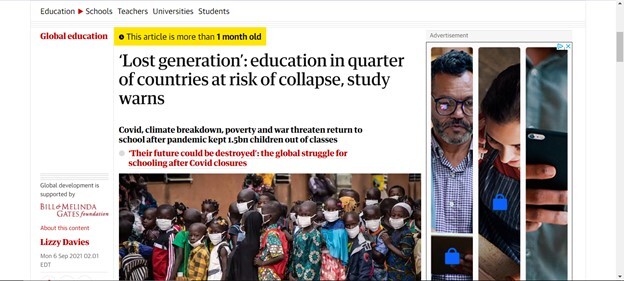 2021-09-06
2021-09-06Empty Classrooms: An Uncertain Future
When COVID hit and schools were forced to shut down, education had to transform in many ways. Students began remote learning through video conferences and online tools like Google Classroom. Moving online not only took away a lot of the personal interaction and connection between students, but it made learning the content even more difficult. Students were less motivated, it was more difficult for them to ask questions and get their questions answered, and many students began to fall behind. Transitioning back into the classrooms has helped students begin to pick back up from where they left off with their class content, but there are still so many absences daily in classrooms all across the country. This article discusses the issue of how future generations will be impacted by the COVID education crisis. -
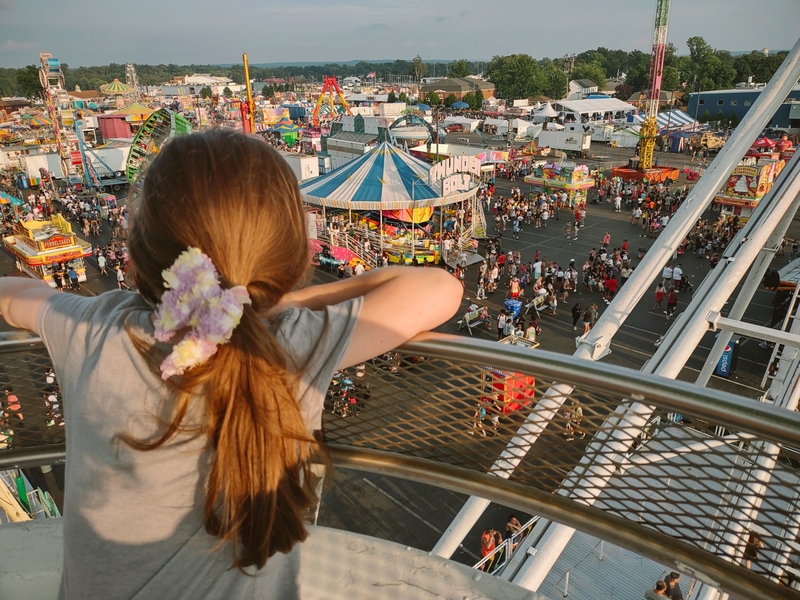 2021-10-06
2021-10-06Reflecting on life. Life has been hard.
It was August 25th, 2019. I had finally reached my parents’ house, all of our belongings* (all that could fit in one car*) in tow, back in my home state of New York. I didn’t want to be here – I grew up in NY, and until two years ago, never intended on coming back. I like to call it the “tectonic plates of life” moving, that moment when you feel something big on the horizon and suddenly, oh hey, here’s a big life decision you didn’t plan on having to make, have fun! Circumstances change, yeah. Life is a pretty unpredictable time warp, and global warming is such a serious issue; it was already sorta tough to not focus on the negatives before 2020. Relationship issues, financial issues, family issues – so many volumes of problems. I already felt like I had lost everything, pride included. Nothing could have prepared me for the pure stress that inevitably comes from a worldwide pandemic. Moving back into my parents’ house as a single parent in her 30’s was just about the biggest pill I could swallow that autumn. Since I had decided to work at Starbucks again, I finally made up my mind to go to college for the first time. In February, I enrolled in summer classes to start at ASU. I was hearing something about a coronavirus, but I wasn’t paying much attention to the news with taking placement tests for college in between working. In March, my daughter’s school closed, and so did Starbucks. It’s hard. It’s hard to not focus on the bad, and it’s so odd to think fondly of the not-so-bad before it. Life just feels a little bit harder. A lot bit, with the increasing violence, hatred and misinformation being spread on a daily basis. Everyone’s experiencing repercussions in one way or another; but something I cannot deny – the something I’m most grateful for: how much I’ve grown, emotionally and mentally. Maybe I can’t credit the stress from the pandemic completely, but it has certainly put all of my other stress in a different perspective. It turned my attention to world issues – I stopped being so wrapped up with myself and my own country, started learning about other cultures after starting college – falling so deeply for that education that I decided to major in Anthropology, with a Minor in Religious Studies. I watched a Ted Talk once that described the good effects of stress.. I feel as if I’m a better human, or at least, a more knowledgeable one. A lot has changed in the past two years. I started college, moved into my own place, moved back into parents’ (hi, tectonic plates!), went from being faithfully Christian to super agnostic/atheist (that was mentally difficult and I’m still processing it) and although I am quite bitter with life in general, I’m also much happier with it, and with myself. I'm a better mom for it. Life has felt like a constant challenge for years now, but I appreciate how easy it is to appreciate the simple things. I may find it annoying that everyone is more on edge, but honestly, who can blame them? Good on everyone for putting up with life! All we can do is learn and grow. And treat the planet well, guys. Let’s do that, too. -
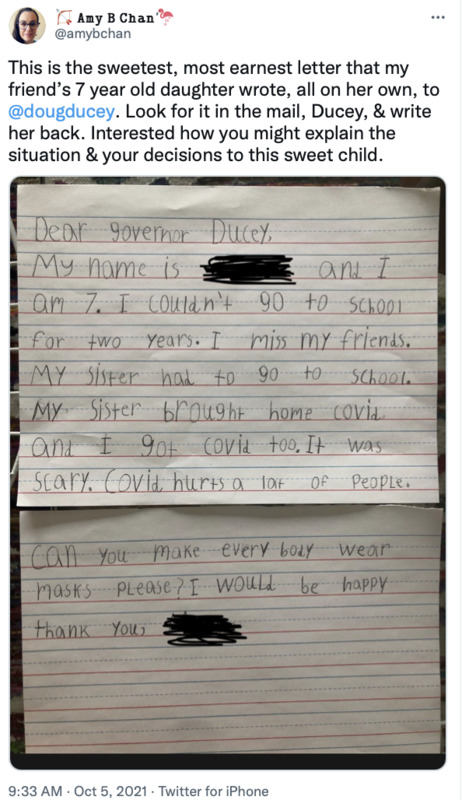 2021-10-05
2021-10-05Child's Letter to Doug Ducey
Twitter user @amybchan tweeted a photo of a letter that a 7-year-old student wrote to Governor Doug Ducey. She tells him that she and her sister both got COVID and asks him to make masks at school mandatory. Governor Ducey has not only refused to mandate masks at K-12 schools in Arizona but he has punished public school districts in the state that have chosen to require masks by withholding federal funding meant for COVID mitigation strategies. Parents, students, and educators have been outspoken about this policy and the federal government has weighed in over the mishandling of these COVID relief funds. My children are in a district that requires masks and have put in a grant application for those specific funds but have been told that it is "pending review" and has not released the money to the district. It is hurting districts who are actually trying to keep students and families safe and rewarding schools for not following proven mitigation strategies. At a time when children under 12 cannot get the vaccine this is especially troubling to many Arizona families. -
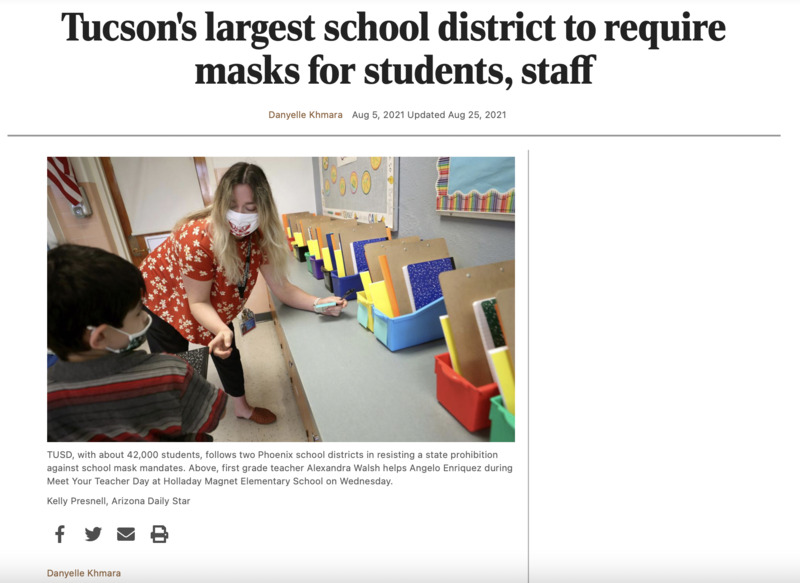 2021-08-05
2021-08-05Tucson Unified requires masks
Arizona Governor Doug Ducey and the Arizona State Legislature have attempted to make it illegal for school districts to require face masks. Tucson Unified School District's school board voted for a mask mandate in defiance of this. Other Arizona districts followed, risking the withholding of COVID relief funds that the governor is refusing to disburse to any district with a mask mandate. A judge later ruled that the law was invalid and schools could have a mask mandate. As someone with children who are in school but are too young to receive a vaccine yet, I hope districts continue to require face masks for the safety of the students and staff. The Arizona Daily Star published a story about TUSD's decision. TEXT OF ARTICLE: Tucson Unified School District is requiring all staffers, students and visitors to wear masks at all its school sites when the school year begins on Thursday, Aug. 5. The TUSD decision defies a new state law that bans public schools from issuing mask mandates. “While Gov. (Doug) Ducey and the state Legislature has decided to ignore the advice of our public health experts and endanger our community, we can’t sit idle and watch COVID inevitably spread throughout our schools and devastate so many TUSD families,” said board member Ravi Grivois-Shah during an emergency Governing Board meeting Wednesday morning. “This is why I will support, along with my colleagues, a requirement to have masks on TUSD campuses and authorize TUSD to enforce this.” The board passed the measure 4-0. Board President Leila Counts was not present for the vote. Masking in schools is an important mitigation measure to slow the spread of COVID-19, and especially the new delta variant, health agencies at the county, state and federal level all say. This week, with Tucson classrooms back at capacity, as nearly 140,000 children across Pima County are returning to classrooms in person, indoor masking is one of the remaining virus mitigation measures schools have left. Social distancing is problematic at most school sites because of large class sizes, and there’s a state ban on a vaccine mandate. Further, a vaccine is unavailable to anyone younger than 12 years old. Between July 20 and Aug. 2, there were 102 virus cases in Pima County schools and 11 outbreaks, according to data from the Health Department. Those figures occurred when most schools here were not yet open. At the end of July, cases in schools accounted for about 8% of the Pima County’s total reported cases, compared to 4% of total cases during last school year — when masks were required. The county also has seen an increase in pediatric admissions and ER visits in children over the last two weeks of July. Vail Unified is the only Tucson school district that has been open for two weeks. Without a mask mandate, the district has 57 current COVID-19 cases in students and 12 in staff workers. The county Health Department has already temporarily closed three Vail classrooms and told staffers and students to quarantine. “Last year, schools had a number of tools that are no longer available,” said Vail Superintendent John Carruth. “They had the ability to do hybrid learning with smaller class sizes, require face coverings and close classrooms if needed. This year, Vail has two instructional options for families — fully in person and fully remote. With all of our teachers assigned to in-person or fully remote instruction, we are leaning on structures we built last year to support students when (the Health Department) requires them to quarantine.” And while some parents, especially those with children not old enough to be vaccinated, fear for their children’s safety in a packed classroom with unmasked people, other parents are staunchly against mask mandates, saying it is unnecessary and even harmful. In an informal survey by the Arizona Daily Star, with 180 participants two weeks ago when the COVID-19 numbers were lower, less than a third of respondents said masks should be optional, in line with the new state law. The other two-thirds said masks should be required or schools should at least have the option to require them. TUSD, with about 42,000 students, follows at least two other school districts in the state, the Phoenix Union High and Phoenix Elementary school districts, in defying the governor and state Legislature by requiring masks. A Phoenix Union teacher sued the district over the mandate, but a court hearing on the case that was set for Wednesday morning was postponed until next week. Science teacher Douglas Hester filed a lawsuit against the Phoenix Union school district’s board members and superintendent on Aug. 2, saying the mandate is illegal and can’t be enforced. A hearing on the case is set for Aug. 13. While most Tucson school districts are strongly recommending that students and staff wear masks indoors, most have also said they don’t intend on mandating masks, including Vail, Marana, Amphitheater, Sahuarita, Sunnyside and Tanque Verde. TUSD Board Member Adelita Grijalva said the mask mandate is necessary for the following reasons: More children are getting sick from the new COVID variant; new evidence has shown that fully vaccinated people may still be able to transmit the virus; the delta variant appears to be more contagious than chickenpox; and many students in the district are too young to be vaccinated. “Probably over 30% of our district cannot be vaccinated because of age,” she said. “I know my youngest can’t. I know many of our children cannot or their friends cannot, and so we have to do everything we can in the district to ensure their safety. That’s our No. 1 priority.” -
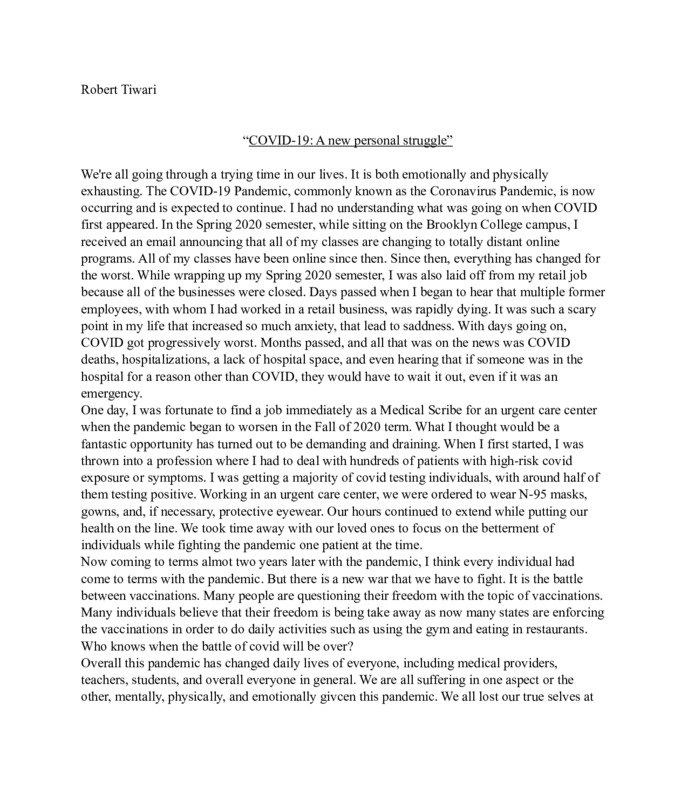 2021-09-30
2021-09-30COVID-19: A new personal struggle
My experience has changed overall with this pandemic. In my paper I discussed the different aspects of how my life changed given the circumstances with work, school, and personal lifestyle. -
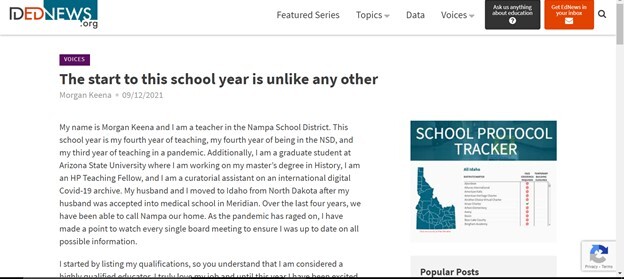 2021-09-14
2021-09-14The Start to the School Year is Unlike Any Other
I wrote an opinion piece for Idaho Education News last week after the latest school board meeting in Nampa, Idaho. Since March of 2020 educators have worked tirelessly to ensure that our students continue to receive a quality education. Initially, educators were seen as 'heroes' of the pandemic. However, over the last 9 months, the rhetoric surrounding schools and teachers has turned nasty. Yet, teachers continue to show up every single day and offer learning experiences to all children. At last week's board meeting, the discussion focused primarily on a mask mandate for our district as hospitals in our state began rationing care given the soaring number of Covid-19 cases. There was an even split between the trustees who were in favor of masking and the trustees who were against masking. This split did not come as a shock to me. However, the line of one trustee hit me in my gut, "I guess I go back to the mission statement. I'm here for the kids, so I'm not going to worry about the adults." The mission and vision statement the trustee is referencing states that teachers offer "exceptional learning experiences" for every child. Given the largely unvaccinated population of our community, the high numbers of teachers out sick, and the alarming number of students out sick as mask mandate seemed like a simple request. However, the board did not vote in favor of helping teachers ensure we are able to provide 'exceptional learning experiences.' Are masks the only answer? Not necessarily. Last year, students attended school 4 days per week while the 5th day was reserved for students to connect with students who were in quarantine/sick and unable to attend school. This year, all of those requirements are gone. That being said, students and teachers attend school 5 days per week and there is no time allotted for teachers to connect with students who are quarantined or sick. Given the latest numbers, about 25% of our entire district is out sick. That is 25% of students who do not have access to their teachers. The article was published on Tuesday, September 14, 2021, and Idaho Ed News shared it on their Facebook page as well. Shortly after 7 pm MST the post has over 160 comments (mostly in favor of teachers), 250 reactions, and over 50 shares. In addition, I have received numerous private messages and emails from other teachers who thank me for giving them a voice during this 'unprecedented' time. While I am still a fairly new teacher with only 3 years of experience, there are veteran teachers who are being pushed to the brink. Many would like to think this is an Idaho problem but the reality is that teachers across the country are feeling unsupported and unappreciated by the communities they serve. I am fearful this will be my last year teaching - I LOVE my job. I remain hopeful that this year turns out to be something amazing. -
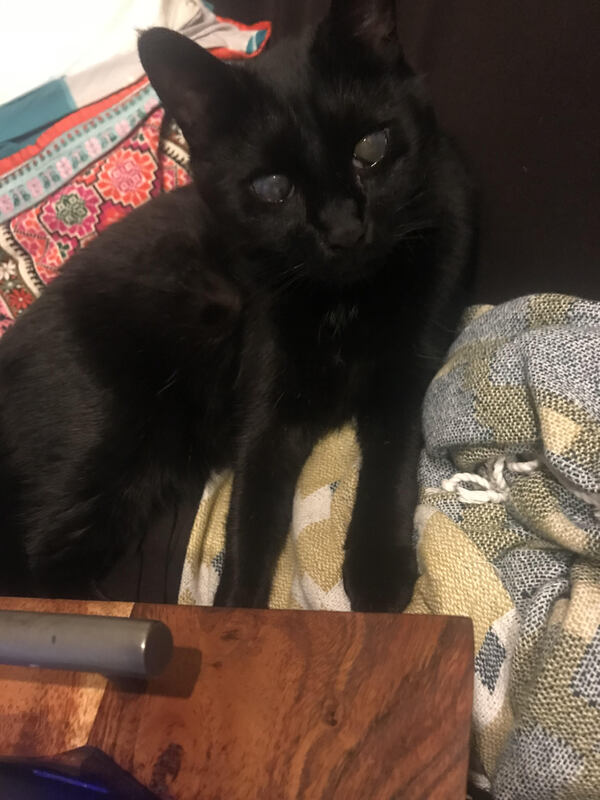 2020-08-24
2020-08-24Adventures in Virtual learning
I’m in grad school now for the second time. I got my B.A. in 2009, and since it was right after the recession and collapse of the loan market, I panicked about jobs and went straight to an M.A. program. It wasn’t the best fit for me professionally or academically, but I didn’t have the life experience to identify that at the time. However, it was still valuable, and I met some of my best friends and professional connections I maintain to this day. Starting in 2012, I left academia and worked in a variety of jobs and fields before realizing I wanted to engage with archives and public history academically again. I found out I got into my dream grad program in late January 2020, and I was elated! Almost a decade after leaving my first graduate program, I was ready to start the next step of my educational and professional career. The excitement of a new city, new colleagues and friends, and fresh intellectual challenges awaited. More than anything, I was thrilled that my program wasn’t online, as that is not my preferred mode of learning. I don’t remember the precise dates, but COVID-19 came onto my radar around then. I know I tracked its progression through Washington state and then its spread to the rest of the country. Finally, it came to my town, and everything shut down. I ended up moving cross-country during the pandemic (another story entirely). Then, horror of horrors, classes began—online. The classes I’d been so excited for were moved to Zoom, my new classmates and colleagues nothing more than little squares. Some of them had pets, which was exciting, but in many ways, it felt like a waste of a year in terms of networking and developing camaraderie. Shifting to what is essentially a virtual, full-time job was a unique challenge. I wore pajamas most days, which was fun. I read all the advice telling me to put on clothes that I’d wear to the office or to campus, but I struggled to summon the motivation to do so when I knew I wouldn’t be going outside. My schedule was interesting, at least until I got a teaching assistantship gig that required more set hours. (The sleep inversion that occurs when the only things you’re required to be at are evening classes is incredible.) However, the lack of oversight meant some really great things! For the first time in my life, I was able to develop a reading/writing schedule that worked well for me. I had to, so I did. I was also able to put Netflix on in the background or play podcasts while I worked. Most importantly, I conquered my unease with online education. While asynchronous courses are still not my preference, over a year of remote learning means that Zoom is old hat. I, an introvert, also have a much easier time reaching out to strangers or new acquaintances. As we’ve met in person over the last month, some of those people have become great friends! While virtual learning and teleworking still aren’t my ideal, I love the new possibilities they offer for more accessible work and educational opportunities. [cat pictures] My coworkers were pretty great, and they miss me a lot now that I’m back working and studying in person. I still see them, but it’s just not the same. -
 2021-03-10
2021-03-10Pandemic downturn leads to animal abuse crisis in Kazakhstan
Kazakhstan is facing a multitude of problems, including a weak currency, dependence on fluctuating oil prices, a closed political system and dire human rights. Amid all of this, the fate of its abused pets may seem trivial. However, passionate activists are rising up to take a stand for animal rights. As the Central Asian state’s socio-economic conditions have worsened over the past year due to the pandemic, more pet owners have been abandoning their animals or committing violence against them. And just as animal shelters are more needed than ever, they’re grappling with an influx of animals, a lack of funding and a legislative vacuum on animal rights. -
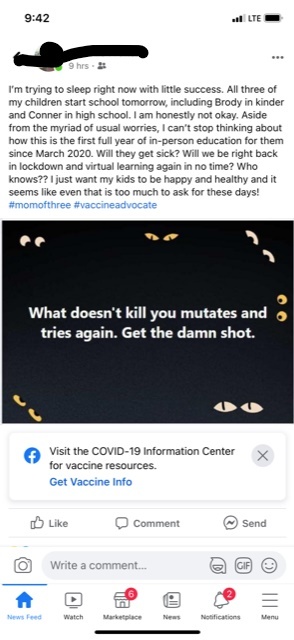 2021-08-11
2021-08-11First day of school
While many on my social media feed are in arms about tighter vaccine regulations, some realize that the pandemic is not over. As the new school year starts there are many mothers who share in my fear. Covid is still alive and well, new strains continue to form breeding in the bodies of the unvaccinated. The worse part is that this time the elderly seem much safer than our children. Our children are being sent back to school, life has returned to "normal" as the number of hospitalized children continues to rise. I share my fears with this friend who popped up on my feed this morning. Will our kids be safe? Will my daughter get infected? Will there be another lockdown? I too feel like it's become too much to ask for my kids to simply be happy and healthy because both now depend on the actions (or misactions) of others. -
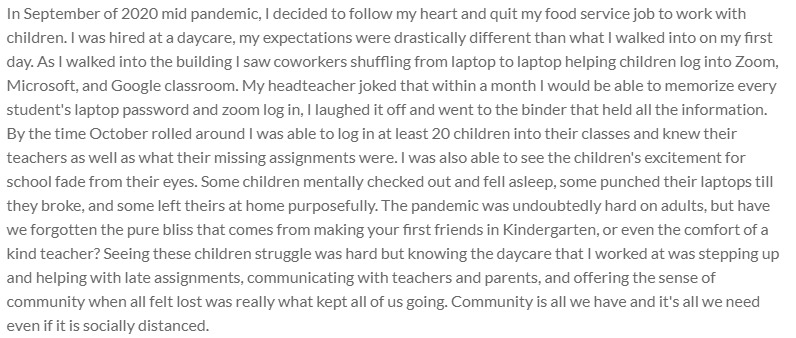 2020-11
2020-11Growing up online
In September of 2020 mid pandemic, I decided to follow my heart and quit my food service job to work with children. I was hired at a daycare, my expectations were drastically different than what I walked into on my first day. As I walked into the building I saw coworkers shuffling from laptop to laptop helping children log into Zoom, Microsoft, and Google classroom. My headteacher joked that within a month I would be able to memorize every student's laptop password and zoom log in, I laughed it off and went to the binder that held all the information. By the time October rolled around I was able to log in at least 20 children into their classes and knew their teachers as well as what their missing assignments were. I was also able to see the children's excitement for school fade from their eyes. Some children mentally checked out and fell asleep, some punched their laptops till they broke, and some left theirs at home purposefully. The pandemic was undoubtedly hard on adults, but have we forgotten the pure bliss that comes from making your first friends in Kindergarten, or even the comfort of a kind teacher? Seeing these children struggle was hard but knowing the daycare that I worked at was stepping up and helping with late assignments, communicating with teachers and parents, and offering the sense of community when all felt lost was really what kept all of us going. Community is all we have and it's all we need even if it is socially distanced. -
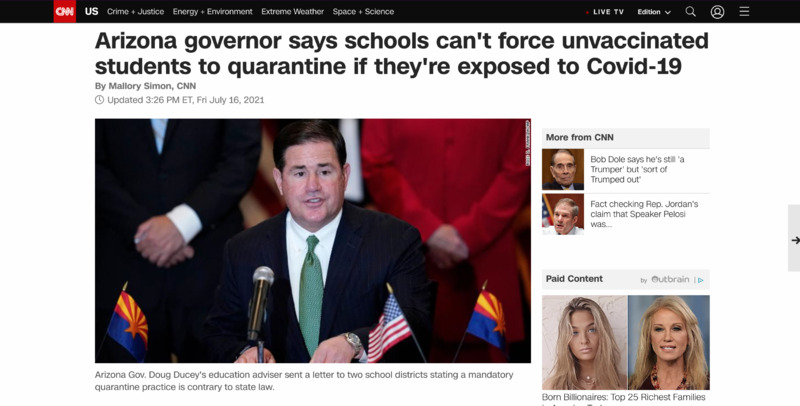 2021-07-16
2021-07-16Arizona governor says schools can't force unvaccinated students to quarantine if they're exposed to Covid-19
This CNN article discusses a recent letter sent out by Gov. Doug Ducey's education adviser, that said requiring unvaccinated students to quarantine after a COVID exposure is against state law because Arizona does not require students to be vaccinated or wear face masks. I am from NYS and this is drastically different than what Gov. Andrew Cuomo is requiring and/or recommending for students in public schools and state universities. It is bizarre how different states and governors are handling the COVID and vaccination situation. -
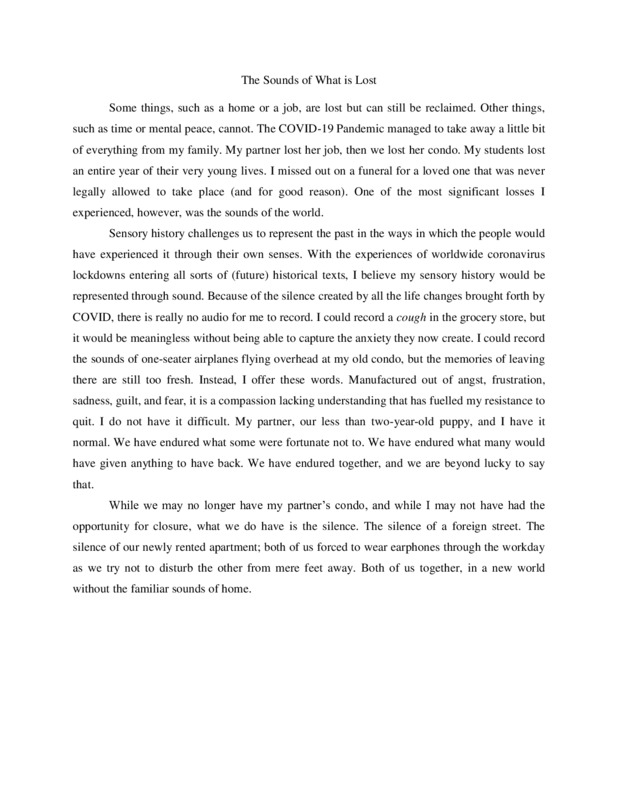 2020-09-30
2020-09-30The Sounds of What is Lost
This story speaks to the ever-changing sounds of the pandemic. Sensory history allows us to engage with the past in ways the invite the senses of the past back into the story. As my partner and I were navigating all the trials and tribulations conjured into existence by the events of the past year and a half, we noticed how silent our home full of sadness and confusion had been. Gone were the overhead aerial shows, the chatty neighbors, the rattling railway tracks... Now there was nothing. Our sense of sound changed dramatically and began to represent how fractured our connection to the world was. We had to be plugged in to tune each other out. We had to stare at a screen to see a familiar face. While most things felt, looked, and smelled different, there was nothing that sounded the same. -
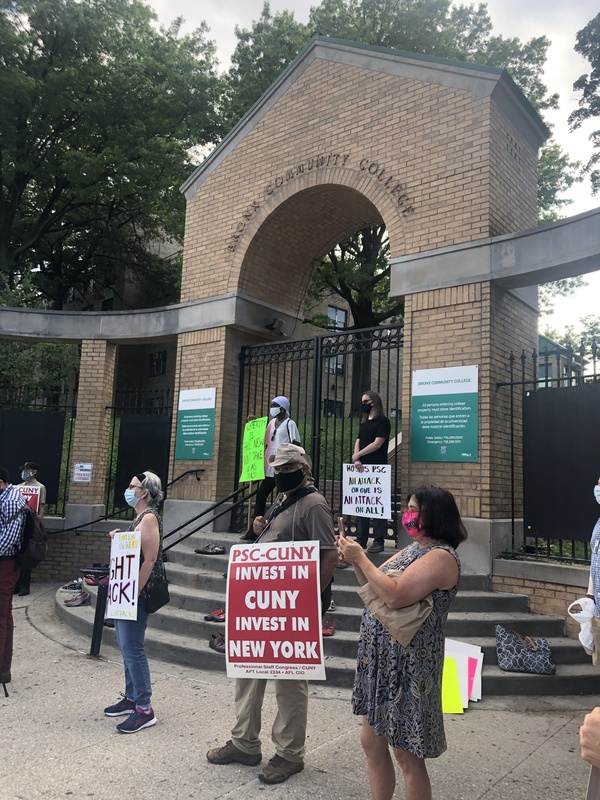 2020-07-15
2020-07-15PSC-CUNY Protest at BCC
For my primary source, I selected a photograph I took at a protest held in front of the Bronx Community College campus on July 15, 2021. The Professional Staff Union of CUNY (PSC-CUNY), the union for the faculty and much of the staff throughout CUNY, organized the event to protest the BCC administration June 26 decision to lay off 36 experienced adjunct professors at the end of their 3-year contracts, even though that their departments recommended that they be rehired. People in the picture include BCC Faculty, staff, and students, as well as those from as well as people from Hostos Community College, who came to support the BCC community and were facing similar cuts. The day was very hot, but I was nervous to the subway because of COVID, so I rode my bike from my home (about 24 miles roundtrip). I was pretty sweaty and probably stinky when I arrived. It was the first time I had been to campus since March 10, when, on my way home from school on the subway, I learned CUNY was moving online. (The campus itself was locked, but we stood in front of the gate on University.) It was also the first time I people from school in person since March; I was so happy to talk to them. It was weird to be with a group people, after months of isolation, but we all wore masks and stood six feet apart. Cars honked their support as they drove by. I selected this source because I want historians of the future to understand how the pandemic hit higher education and the connections among the COVID crisis, social justice movements, and education. Although I went to larger marches after the murder of George Floyd, I believe funding for CUNY is a form of social justice. I was angry that politicians and school administrators were giving lip-service to the phrase Black Live Manners, while cutting funding and jobs from CUNY. BCC’s students are overwhelmingly Black and Latinx, and many studies show that a CUNY education is one of the best schools for supporting social mobility, helping people support themselves and their families. Firing the adjuncts not only meant the teachers lost their income, and, sometimes, their health insurance, but that BCC students would be in larger classes; larger classes mean faculty have less time to devote to each student, which can make it harder to for students to succeed. While I understood enrollment was down and the budget from the city and state would likely be smaller because of the economic toll of the pandemic, I thought there were other places the administration could cut costs. (Such as their own salaries). I want historians to see that the faculty and staff of CUNY fought for what their students deserved and the connections among CUNY, social justice, and New York’s economic recovery. I also want them to see how people approached protests, which require gathering together with other people and often chanting or shouting, while in the middle of a pandemic that required people to stay apart and cover their mouths. -
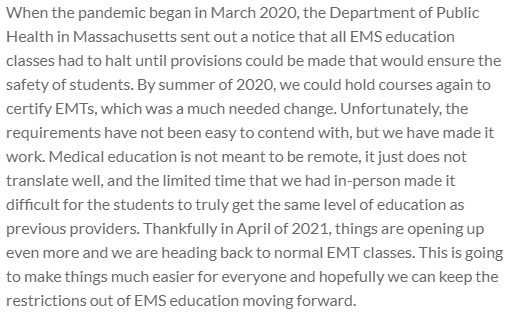 2021-04-25
2021-04-25EMS education in Massachusetts April 2021
When the pandemic began in March 2020, the Department of Public Health in Massachusetts sent out a notice that all EMS education classes had to halt until provisions could be made that would ensure the safety of students. By summer of 2020, we could hold courses again to certify EMTs, which was a much needed change. Unfortunately, the requirements have not been easy to contend with, but we have made it work. Medical education is not meant to be remote, it just does not translate well, and the limited time that we had in-person made it difficult for the students to truly get the same level of education as previous providers. Thankfully in April of 2021, things are opening up even more and we are heading back to normal EMT classes. This is going to make things much easier for everyone and hopefully we can keep the restrictions out of EMS education moving forward. -
 2021-04-07
2021-04-07NC Law proposed would ban Trans Students and Report Them
A new law making its way through the North Carolina legislator would force educators to out Transgender students to their parents. It also would not allow for people younger than 21 to have hormones for transgender surgery or to have surgery or anything like that. -
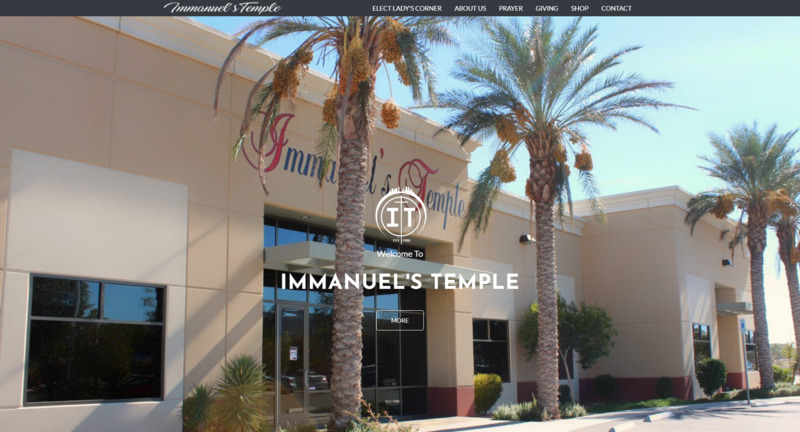 2020-03-15
2020-03-15Rest in a Time of Time of Unrest: COVID-19 Quaratine, Religion, and Public Life Reflection
My personal experience with COVID-19, My active involvement in my religious community and my public life reflection during times of a pandemic and political/ social unrest. -
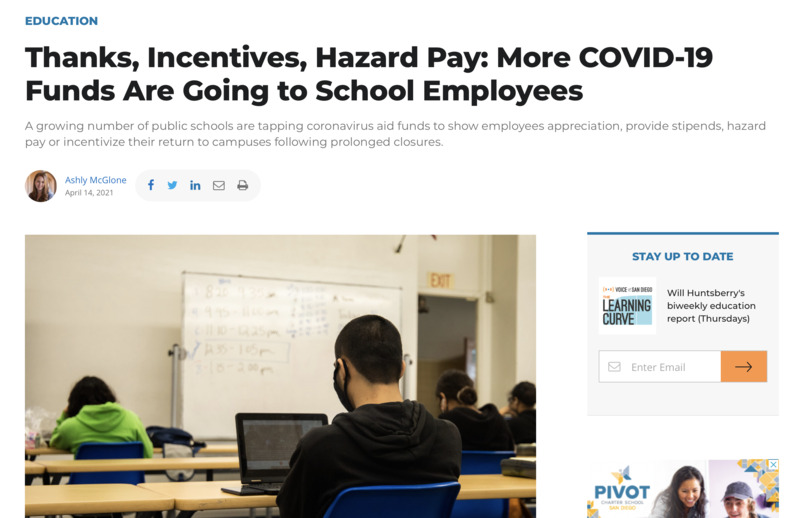 2021-04-14
2021-04-14California teachers are getting one-time stipends as incentives and hazard pay
As much as there are "reopening schools" supporters, there are about as much hesitant to do so. You might hear the hesitations from concerned parents and children, but school employees experience it as well. Schools are typically crowded and people are in close quarters at almost all times of the day. Although California regulations are to remain 3-6 feet apart in and out of classrooms, it continues to be a difficult challenge. Moreover, such precautions might lessen the spread but they're not guaranteed. This is where aid funds in the form of stipends come in. These stipends are displays of gratitude, used as an incentive and, unfortunately, hazard pay. More than $2 billion will be distributed across 42 K-12 school districts in the San Diego region. Stipends vary, however. There are one-time stipends for Lakeside school district teachers who have taught since October 1, 2020 of $450 to $900. Special education teachers in the same district will receive more, about $500 to $1000. Despite the incentives, there is an ongoing conflict over who is eligible for the stipend (to my personal surprise). One argued that only employees returning to campus are eligible, while there was a debate over whether those teaching since Fall 2020 should even be compensated for. If this were the criteria, it should simply be an incentive to return as the act of “being appreciative” would not exclude any teachers who have and will continue to work during the pandemic. -
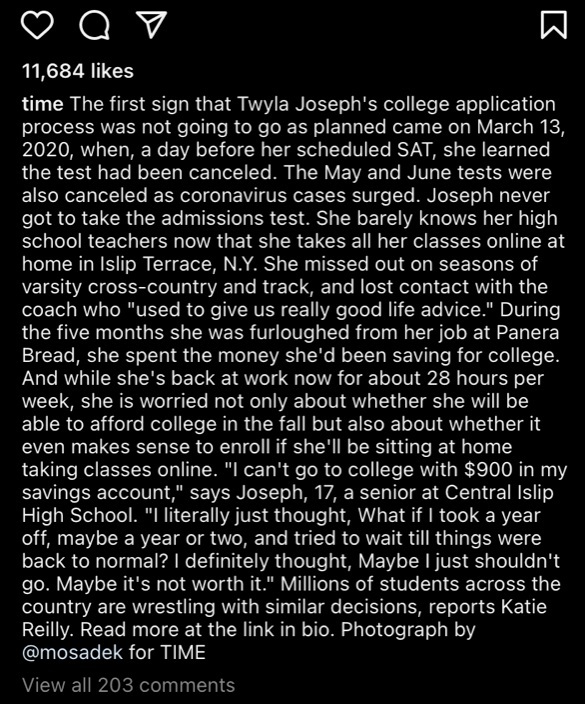 2021-04-02
2021-04-02The Lost Year: How the Pandemic Changed a Generation of Students
Time magazine explores the effects COVID-19 has had on students, especially those who spent their last year in High School dealing with quarantine and virtual learning. -
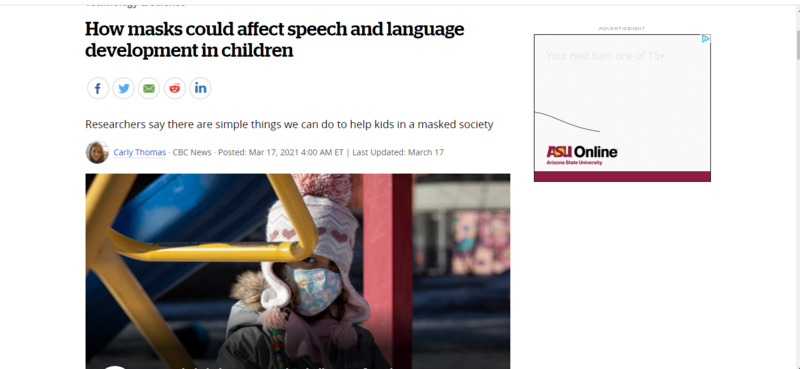 2021-03-17
2021-03-17Is Early Childhood Development Declining?
There are socialization concerns among adults and adolescents, and most are aware of the reasons behind that. However, children still in early developmental stages (infants, toddlers) may struggle in the long-term. The article primarily revolves around the words and expertise of senior scientist at Haskins Laboratories and a professor adjunct at the Yale Child Study Center, David Lewkowicz. There are physical, emotional, and mental struggles that could negatively impact early childhood development. Examples of these struggles are with how they learn languages by visual and auditory associations, which can be difficult with masks. Another related to masks is facial recognition. Lewkowicz isn't filled with bad news, though. More time and direct attention given to face-to-face interactions and more explicit expressions of emotions can help compensate. These early years are when children are very adaptable as they take in the world around them, so there is hope for more perceptive children coming out of the pandemic rather than a decline. -
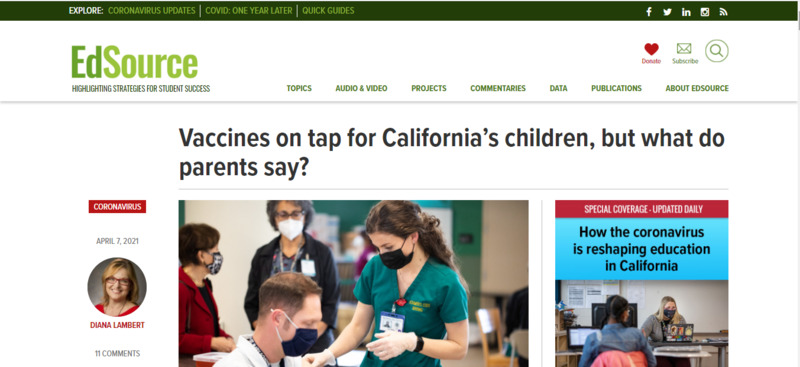 2021
2021Vaccine Eligibility Expanding to Adolescents, Californian Parents React to Schools Reopening
California is soon expanding their vaccine eligibility to 16 and older on April 15, 2021. The plans for expanding it even more aren't expected to be for sometime. However, the announcement from Pfizer-BioNTech stating that the vaccine is safe and effective for 12 and older does give some hope for a quicker time frame. The is a focus on giving children and adolescents back their youth. There are schools opening with hybrid instructions (online and on-site instruction), but there the on-site hours are always rotating students to minimize crowd interaction. The article goes on to include opinions from parents of adolescents, which emphasized the importance of getting everyone (school faculty and students alike) vaccinated. Everyone seems eager to get back to pre-pandemic life as soon as possible, so the eligibility expansion does receive as good news and gives the public hope. Naturally, however, it’s not all good news as people need to remain informed and cautious. The article reminds us that variants of the virus have the potential to harm younger children. Notably, it’s the B117 strain that’s been said by Dr. Michael Osterholm, director of the Center for Infectious Disease Research and Policy at the University of Minnesota, that can be “50% to 60% more contagious than other strains of Covid-19” from his observations of Minnesota schools. -
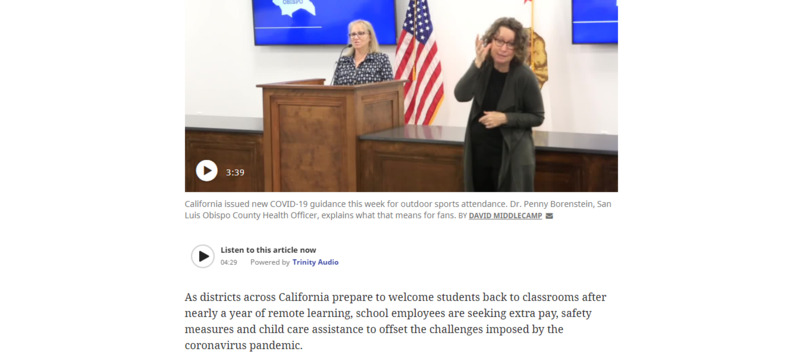 2021-04-10
2021-04-10Child Care Concerns Persist Despite Returning to In-Person Instruction in Californian Schools
Californian schools are opening back up, but there continue to be concerns over employees and their families. Although there have been some employees working at schools the past year (i.e. custodians), those working remotely (i.e. teachers) continue to face challenges in child care. Due to this, "Los Angeles Unified School District earlier this week announced it would provide a day care stipend of $500 a month for each child under age 5 to all full-time employees, including teachers." The Service Employees International Union (SEIU 1021) did clarify within the article by Sacramento Bee that some demands could not be met. Among the demands was a one-time stipend amount of $1,500 for employees with children aged 3 - 14. This is an ongoing issue with its latest update on April 10, 2021 being: a weekly stipend of $125 for employees with children aged under 14. This represents one of the issues employees of educational institutions are facing. They’re hesitant to return to in-person instruction. Although there’s a fair amount of news coverage of children returning to school, the ones hesitant (especially those responsible for the school to run smoothly) should also be acknowledged. -
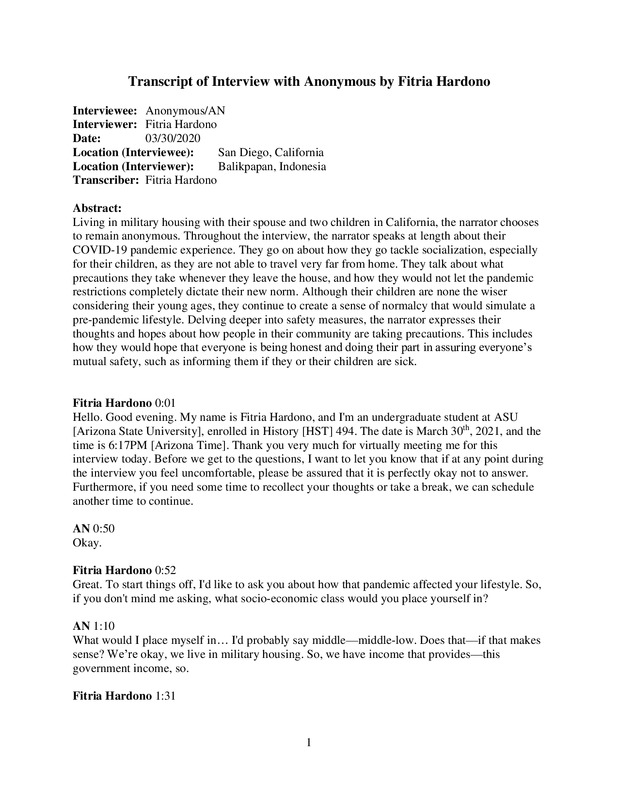 03/30/2021
03/30/2021Anonymous Oral History, 2021/03/30
Living in military housing with their spouse and two children in California, the narrator chooses to remain anonymous. Throughout the interview, the narrator speaks at length about their COVID-19 pandemic experience. They go on about how they go tackle socialization, especially for their children, as they are not able to travel very far from home. They talk about what precautions they take whenever they leave the house, and how they would not let the pandemic restrictions completely dictate their new norm. Although their children are none the wiser considering their young ages, they continue to create a sense of normalcy that would simulate a pre-pandemic lifestyle. Delving deeper into safety measures, the narrator expresses their thoughts and hopes about how people in their community are taking precautions. This includes how they would hope that everyone is being honest and doing their part in assuring everyone’s mutual safety, such as informing them if they or their children are sick. -
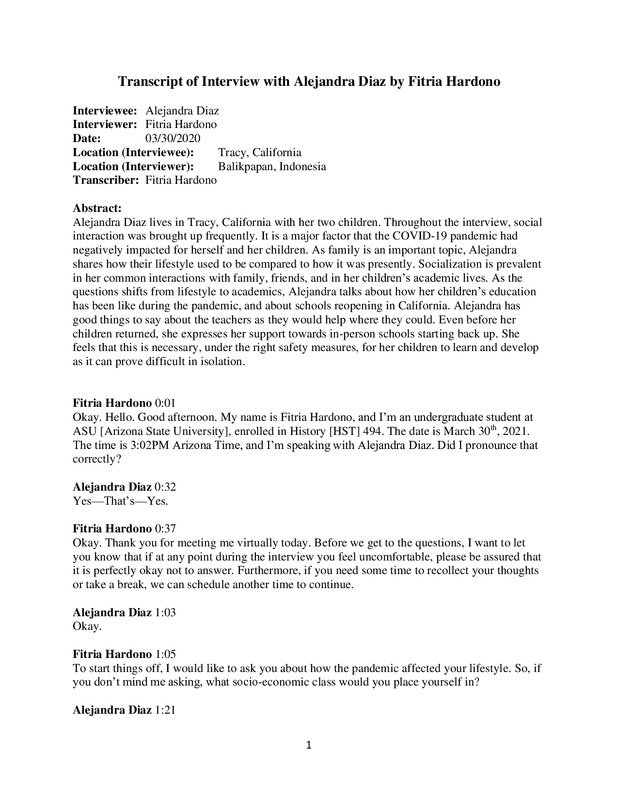 03/30/2021
03/30/2021Alejandra Diaz Oral History, 2021/03/30
Alejandra Diaz lives in Tracy, California with her two children. Throughout the interview, social interaction was brought up frequently. It is a major factor that the COVID-19 pandemic had negatively impacted for herself and her children. As family is an important topic, Alejandra shares how their lifestyle used to be compared to how it was presently. Socialization is prevalent in her common interactions with family, friends, and in her children’s academic lives. As the questions shifts from lifestyle to academics, Alejandra talks about how her children’s education has been like during the pandemic, and about schools reopening in California. Alejandra has good things to say about the teachers as they would help where they could. Even before her children returned, she expresses her support towards in-person schools starting back up. She feels that this is necessary, under the right safety measures, for her children to learn and develop as it can prove difficult in isolation. -
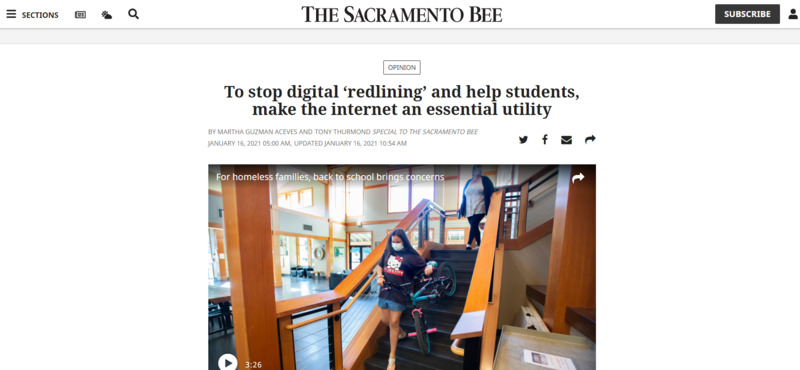 2021-01-16
2021-01-16To stop digital ‘redlining’ and help students, make the internet an essential utility
Last year, Gov. Gavin Newsom signed Senate Bill 98 to help ensure that all of our children are able to successfully continue their education virtually through the Internet. Unfortunately, although this requirement on our educators came with significant funding, the California State Legislature did not couple it with any requirements for internet service providers to actually provide service. We have seen this problem manifest acutely in the many school districts around the state that are scrambling to keep students connected. California’s surge in COVID-19 cases means remote education will continue to be the safest way to continue learning for many students in the weeks and months ahead. But the need for connectivity will not end after the pandemic. If we truly want to level the playing field for students in California — to ensure all students have access to the technology and tools that not only help them access their learning remotely but will be needed for success the rest of their lives — we cannot rest until the internet flows like electricity. -
 2021-03-31
2021-03-31Confederacy of Treaty Six First Nations rejects the Alberta K-6 curriculum
This is a tweet of a statement sent out from the Confederacy of Treaty Six First Nations, rejecting the proposed Alberta K-6 curriculum which has become vastly unpopular for its blatant racist and white supremacist undertones. For example, one component of the curriculum would have students learning the slogan of the KKK; to be applied with learning “why some people would support” such a slogan. As I type this, this sounds unreal, or some kind of sick joke but I assure you this is real. Interestingly, when the initial flak was received for the nature of this curriculum, the Alberta government was quick to claim that there was First Nations oversight on the development of this document – this statement from the Confederacy of Treaty Six First Nations says otherwise. The curriculum itself has a very Anglo-centric programming, focusing on the history of Anglo-Saxons, the British Empire and the role of the Dominion of Canada in the empire. On top of this, there is little to no reference to residential schools; rather it has been removed in early grades, which goes against the call to education by the Truth and Reconciliation Committee. The Confederacy of Treaty Six Nations is writing in direct response to this, stating that a proper Alberta curriculum should be able to express the diverse nature of Alberta. It should account for the horrors of colonialism, a word which the current curriculum doesn’t mention once. -
 2021-03-29
2021-03-29School Districts in California Setbacks while Reopening
This explains which and how many school districts in California have reopened. Many have remained closed for a year or more. As the article's title suggests, "A majority of school districts are now open. But not everyone wants to return," they share why they're seeing a slow intake of students. They also reported that the Long Beach school district had their teachers vaccinated earlier, therefore was able to open their schools earlier than the rest of the state.
